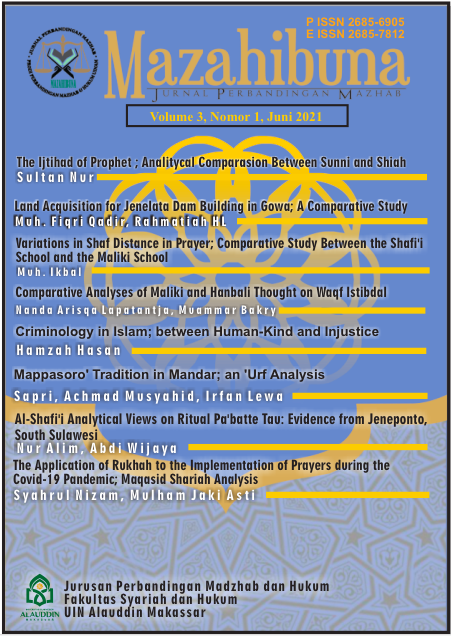The Ijtihād of Prophet; Analytical Comparison between Sunni and Shiah
Abstract
This article aims to reveal the nature of Ijtihad in the eyes of linguists and scholars of Usul Fiqh from the Sunni and Shia circles. After that, it goes to the core of the discussion, which is trying to explain what the Ahlusunnah's views regarding Ijtihad on the Prophet are, of course, accompanied by the arguments and arguments—then followed by an explanation of how the Shia perspective on the issue of the Prophet's Ijtihad. The study results show that Ijtihad on the Prophet saw is a classic issue that has been a long discussion, and each has a different view and is supported by accurate and conclusive arguments. Those who support the view that the Prophet SAW in issuing laws for an issue have used the Ra'yu and Ijtihad (Qiyas) methods, and this view is in great demand by the Ahlussunnah scholars. Of course, this view is not without solid arguments. It is even supported by arguments from the Qur'an and hadith, which are the primary basis and source for every problem. The second group argues that it is impossible for the Prophet to Ijtihad in using Qiyas and Ra'yu because everything is clear enough for the Prophet and no longer requires any effort to use Ijtihad to uncover the law of a problem. Supporters of this view are mainly formed from among scholars or scholars of Usul Fiqh of the Imamiyah Shia School.
References
Al-Qur’an.
Abu Daud, Sulaiman bin Asy’ats. Sunan Abu Daud. Beirut: Dār Ihyā al-Sunnah al-Nabawiyah, tt.
Ahmad bin Hanbal. Al-Musnad. Beirut: Dār Shādir, tt.
Amidi, Abu al-Hasan Ali Banabi Ali. Al-Ahkām fī Ushūl al-Ahkām. Beirut: Dārul Kutub al-Ilmiyah, 1405 H.
Amir Badsyah, Muhammad Amin. Taisīr al-Tahrīr. Beirut: Dārul Fikr, tt.
Ansari, Muhammad bin Nizamuddin. Fawātih al-Rahamūt bisyarh Muslim al-Tsubūt fī Ushūl al-Fiqh. Beirut: Dārul Fikr, tt.
Badakhsyi, Muhammad bin Hasan. Manāhīj al-‘Ushūl. Beirut: Dārul Kutub al-Ilmiyah, tt.
Garanati, Muhammad bin Yusuf. Bahr al-Muhīth. Beirut: Dārul Kutub al-Ilmiyah, 1422 H.
Ghazali, Muhammad bin Muhammad. Al-Mustashfā min ‘Ilm al-Ushūl. Beirut: Muassasah al-Risālah, 1417 H.
Hilli, Jamaluddin Hasan bin Yusuf. Mabādī al-Ushūl ilā ‘Ilm al-Ushūl. Qom: Maktab al-I’lamul Islami. Version 3. 1404 H.
Ibnu Faris, Ahmad. Mu’jam Maqāyis al-Lughah. Beirut: Dārul Kutub al-Ilmiyah, 1420 H.
Ibnu Hajib, Jamaluddin Abi Amru Utsman bin Umar bin Abi Bakar al-Maqri al-Nahwi al-Maliki. Muntaha al-Ushūl wa al-Amal fī ‘Ilm al-Ushūl wa al-Jadal. Beirut: Dārul Kutub al-Ilmiyah, 1405 H.
Ibnu Katsir Dimasyqi, Ismail. Tafsir al-Qur’an al-‘Azhīm. Beirut: Dār al-Andalus, tt.
Ibnu Manzur, Jamaluddin Muhammad bin Mukrim. Lisān al-‘Arab. Beirut: Dār al-Fikr. Cet 8, 1424 H.
Ishfahani, Ragib. Mufradāt fī Alfāz al-Qur’an. Beirut: Dārul Qalam, 1416 H.
Ismandi, Muhammad bin Abdulhamid. Badzl al-Nazhar fī al-Ushūl. Kairo: Maktabah Dār al-Turāts, 1412 H.
Jurjani, Ali bin Muhammad. Al-Ta’rīfāt. Magrib: Muassasah al-Hasy, 1427 H.
Khu’i, Sayid Abul Qasim. Al-Ra’yu al-Sadīd fī al-Ijtihād wa al-Taqlīd. Najaf: Mathba’ah al-Nu’man, 1386 H.
Khurasani, Muhammad Kazim. Kifāyah al-Ushūl. Tehran: Nasyr Islamiyah, tt.
Muhaqqiq Hilli, Najmuddin Ja’far bin Hasan al-Hazali. Ma’arij al-Ushūl, Qom: Muassasah Alul Bait, 1403 H.
Qurtubi, Muhammad bin Ahmad al-Anshari. Al-Jāmi’ al-Ahkām al-Qur’an. Beirut: Dārul Kutub al-Ilmiyah, 1420 H.
Sarakhsi, Abu Bakar Muhammad bin Ahmad. Ushūl Sarakhsī. Beirut: Dārul Ma’rifah, tt.
Suyuti, Abdurrahman bin Abi Bakar. Al-Dur al-Mantsūr fī Tafsīr al-Ma’tsūr. Beirut: Dārul Kutub al-Ilmiyah, 1421 H.
Syahid Sadr, Sayid Muhammad Baqir. Durūs fī ‘Ilm al-Ushūl. Qom: Muassasah al-Nasyr Al-Islami, 1415 H.
Syarif al-Umri, Nadiyah. Ijtihād al-Rasūl. Beirut: Muassasah al-Risalah, 1401 H.
Tirmizi, Muhammad bin Isa. Al-Jāmi’ al-Shahīh. Beirut: Dārul Kutub al-Islamiyah, 1408 H.
Turaihi, Fakhruddin. Majma’ al-Bahrain. Beirut: Dār Ihyā al-Turāts al-Arabī. Cet 2, 1403 H.
Tusi, Muhammad bin Hasan, al-‘Uddah fī Ushūl al-Fiqh, Qom, version 1, 1417 H.
Zamakhsyari, Mahmud bin Umar. Asās al-Balāghah. Beirut: Dārul Fikr, 1420 H.

This work is licensed under a Creative Commons Attribution 4.0 International License.
Authors who publish with Mazahibuna: Jurnal Perbandingan Mazhab agree to the following terms:
- Authors retain copyright and grant the Mazahibuna: Jurnal Perbandingan Mazhab right of first publication with the work simultaneously licensed under Creative Commons Attribution License (CC BY 4.0) that allows others to share the work with an acknowledgment of the work's authorship and initial publication in this journal.
- Authors can enter into separate, additional contractual arrangements for the non-exclusive distribution of the published version of the work (e.g., post it to an institutional repository or edit it in a book), with an acknowledgment of its initial publication in this journal.
- Authors are permitted and encouraged to post their work online (e.g., in institutional repositories or on their website) before and during the submission process, as it can lead to productive exchanges, as well as earlier and greater citation of published work.

